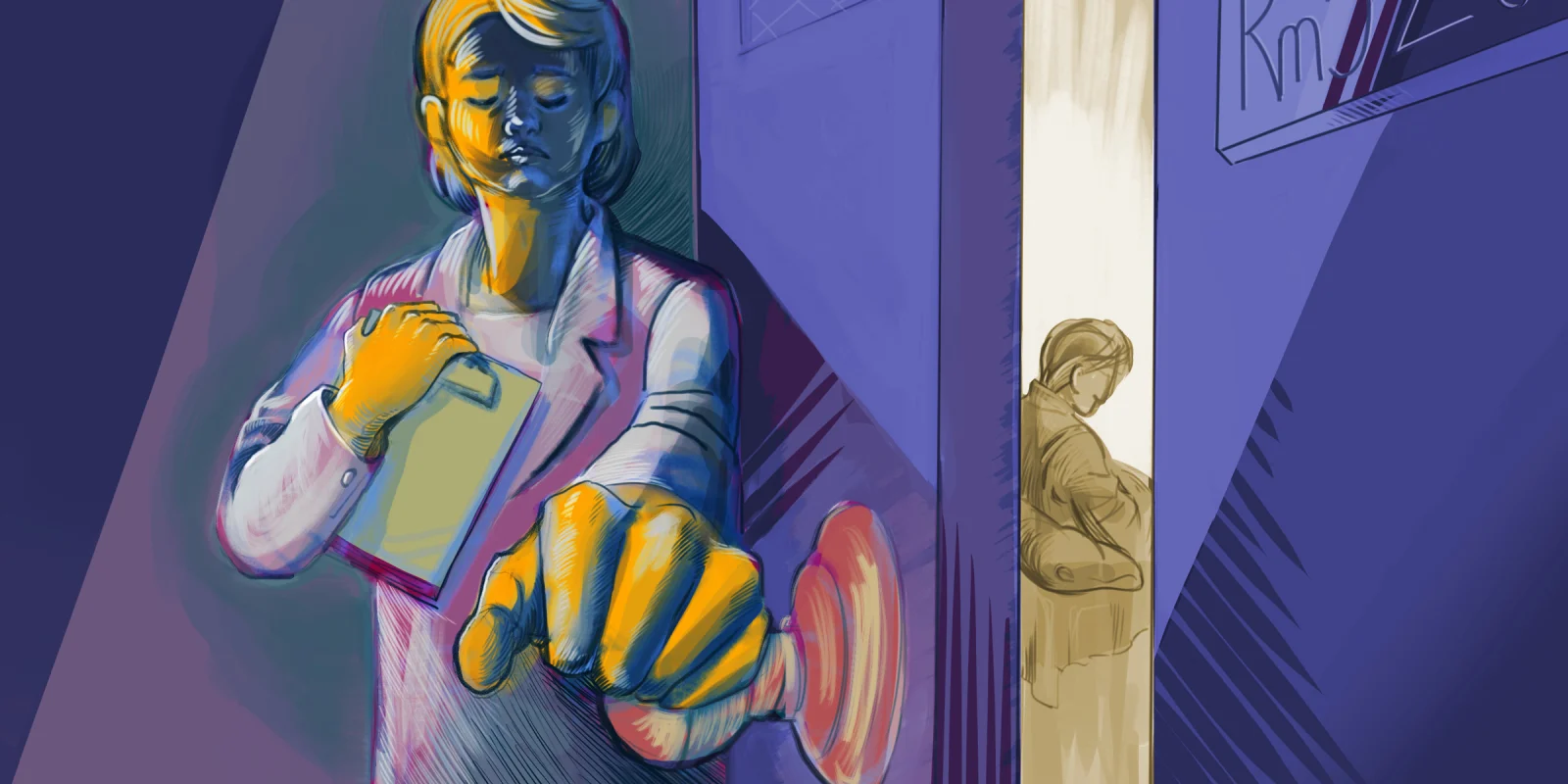“What the f--- is wrong with you?” screamed Sarah.
She was in one of the most vulnerable positions we physicians ask our patients to assume. Flat on her back. Feet in cold stirrups. Legs wide open. Thin useless paper sheet.
I was a third year medical student at the time. Finally, I had made it to the clinical world. My presence served as both a learner and a chaperone for the procedure. The supervising physician towered over me as I cautiously inserted the speculum. His proximity both comforted and bothered me. That was when the yelling started.
“I am in so much pain. You have no idea what the f--- you are doing.”
I had performed a few Pap exams already, and had undergone many myself; none had taken a turn like this. I quickly tried to think through my options. Advance the speculum? Or pull it out? Maybe offer some comforting words? Or ask my supervising physician for guidance? Before I could choose, the physician had already pushed my hand away and motioned for me to switch spots with him — a sign dreaded by all in training. Standing up from the stool, I quickly backed to the corner of the room as I apologized profusely.
Sarah lifted herself up and looked me straight in the eyes.
“Never touch me again.”
I have no memory of how the rest of the visit went. I just kept replaying Sarah’s words in my mind. Where had I gone wrong? The physician had a busy patient panel so we quickly moved onto the rest of his afternoon of patients: diabetes, high blood pressure, UTI. No more Paps for the day, thank God. No time for feedback or debriefing. I thanked him for the day, logged the Pap exam as proof of procedural experience, and developed a fear of performing medical procedures. This left internal medicine as one of the only viable career choices for me.
Two years later I started residency and had my own panel of patients in the primary care clinic. The first thought I had when I saw a patient who was a woman between the ages of 21 and 65 was “please, please, please I hope they are not due for a Pap.” It was always the first thing I checked in the medical chart. To the outsider, it looked like I was incredibly passionate about making sure patients were up to date on their preventative exams. This was true, but for me, it was also a strategic avoidance of having to reenact a traumatic experience.
Depending on the Pap status, I either sighed with intense relief or planned which justification I’d give that day. Refer to the obstetrics and gynecology practice? Ask the supervising doctor to perform so I could observe their technique? Defer to the next visit, hoping I'd have a little more confidence by then? Or maybe next time they would be scheduled with a different doctor. I wanted the patient to have the Pap done, just not by me.
How is it that one bad experience, compared to my many prior neutral or even positive experiences of performing Pap exams, dictated my practice? Wasn't I supposed to provide objective, rational, scientific medicine? I was mad at myself for not having a methodology that was evidence-based.
My avoidance of Pap exams was thankfully recognized by Dr. Garcia, one of the supervising doctors. "You should do the Pap today. You have the time. Jessica needs it done." This was the sign of an excellent clinician: one who does what needs to be done as soon as possible. And also the sign of an excellent educator: one who identifies potential shortcomings and kindly, but firmly, encourages perseverance.
In the room I went. I tried my best to hide my nervousness. After delivering my three minute speech about wanting to make sure she was comfortable, I inserted the speculum. No screaming. I collected her cervical cells with the brush. Still no screaming. I removed the speculum. She was already getting up to get dressed. “Thanks so much Dr. Grinberg. That was great.” Why didn’t I feel better?
I decided to confide in Dr. Garcia about my long standing fear of Paps. Keeping all this anxiety inside me was not helping. Dr. Garcia not only gave the time to listen to me, she also had her own stories of patients getting upset, making me feel less alone. Maybe it wasn’t something completely wrong with me. We reflected on empathizing with the patient during such moments of vulnerability and pain and trying to understand their point of view. Dr. Garcia also provided concrete advice on how to troubleshoot a Pap that is not going well in the moment: different speculum sizes to use, speculum positions to try, and relaxation techniques to suggest. From that day on, Paps no longer felt impossible to me.
As I’ve spent more time in the hospital, I’ve seen all types of negative interactions and their long-lasting repercussions. These were scarring interactions for students, but also for clinicians and patients. The student who swears to himself he will not choose a certain speciality after a particular physician embarrassed him. The patients who have not seen a doctor or stepped into a hospital for years after a traumatic interaction with the health care system. The practitioners that order a certain blood or imaging test that doesn’t clearly seem indicated because of a previous lawsuit. These moments can lead to such a profound distrust of medical care and of each other. They create stumbling blocks, no-go zones — setbacks in our confidence and practice.
When I start spiraling with these thoughts, I now try to evoke the positive experiences that have the potential to have as much impact as the negative ones. There are the patients who change their lifestyles after speaking to one inspiring physician; they stop addictive behaviors, they lose weight, they take life-saving medications. There are the students who choose their career paths based on one day of shadowing a compassionate physician. I also equally try to identify and talk openly about the negative experiences so that we all don’t keep them to ourselves. With appropriate recognition, we can acknowledge and process, but also resist the urge to generalize. Past experiences do not always have to predict future ones. If only I had had this realization that afternoon with the supervising doctor at the time after Sarah told me to never touch her again.
Have you avoided performing a medical procedure? Why? Share what brought you back to it in the comments.
Charlotte Grinberg is a fellow in hospice and palliative medicine at Beth Israel Hospital in Boston, MA. Her writing has appeared in JAMA, Health Affairs, and the Annals of Internal Medicine. She tweets at @drcharlotteG. She was a 2020–2021 Doximity Op-Med Fellow and continues as a 2021-2022 Op-Med Fellow.
All names and identifying information have been modified to protect patient privacy.
Illustration by April Brust







